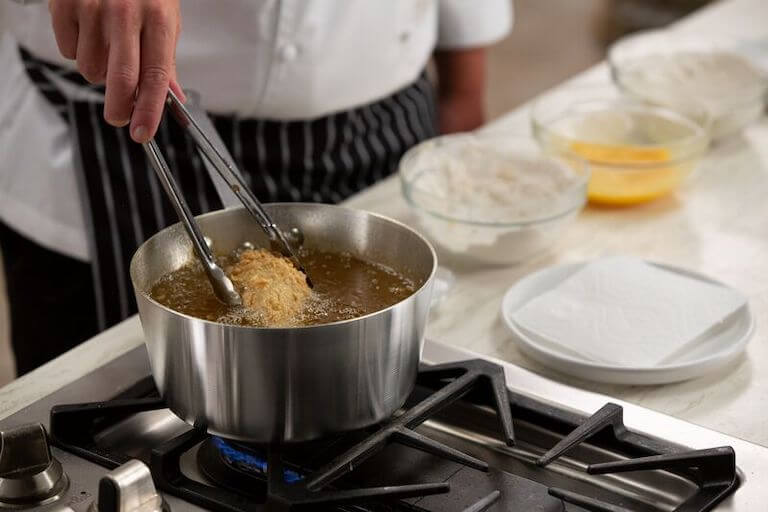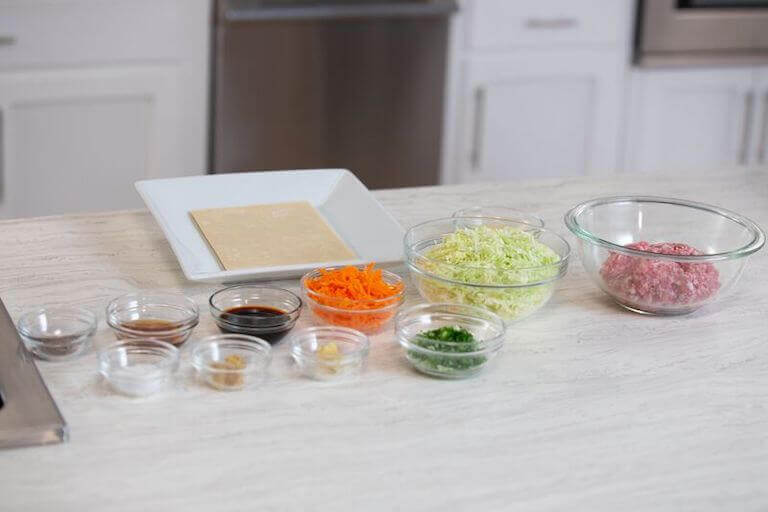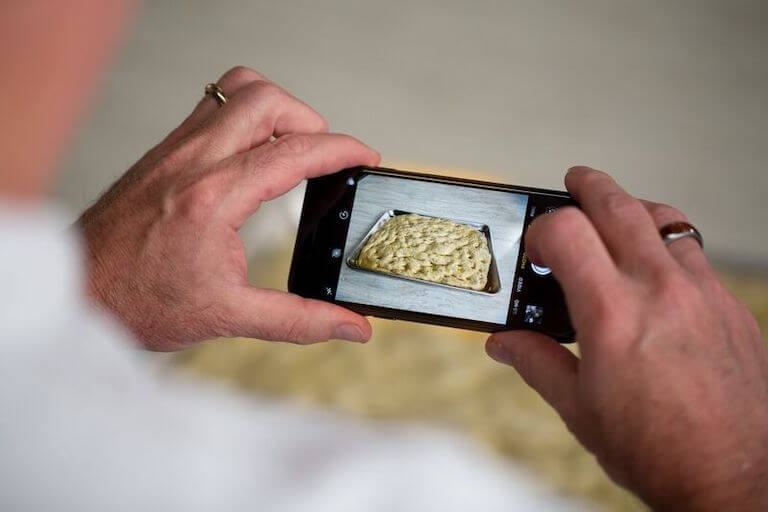A good culinary school curriculum can provide students with valuable skills and tools that can help them succeed in their careers. But where should you get that education—online or in-person?
Both platforms have their own advantages!
In this article, we’re sharing five major benefits of attending culinary classes online. Find out if online degree or diploma programs can fit into your life and help get you closer to your career goals.
1. No Commutes and No Traffic
For busy students, removing the commute from the culinary school equation can be a big bonus. If you’re working while attending school or raising a family, that extra drive time can make it a challenge to fit education into your life.
And that’s assuming you even have a physical culinary school nearby! Some people, especially those in rural areas, may not have such a school within driving distance. In the past, this meant that aspiring students had to either relocate or give up on their dreams of culinary school.
But with online culinary classes, the distance factor is no longer part of that equation.
“I honestly could not have done it in person. It just wouldn’t have worked out. I’m not in a town near that has a culinary program. I have a kid. My life would not allow me to go to school somewhere. So [online baking and pastry school] really was perfect.”*
Tara B., Escoffier Online Baking & Pastry Student
Pro tip: even when attending school from home, students still have to come ready for class! Online students must wear their clean Escoffier uniform, including a chef’s coat, apron, and skull cap.
2. Complete Your Coursework on Your Own Schedule
The online culinary curriculum at Escoffier is comprised of live video sessions, pre-recorded video content, reading assignments, and labs with cooking assignments. As long as students meet their program deadlines, they can complete this coursework whenever it’s convenient for them!
While students are encouraged to attend the live video sessions so they can ask questions and participate with their fellow students in real-time, they can also watch the recordings after the fact if they have to miss the live sessions for work or other obligations, or would like to review the content.

Students can save most of their coursework for two or three days per week, or they can spread it out, completing an hour here and an hour there every day–whatever best fits within their schedule. This flexibility can make a culinary education accessible to more people than ever before.
3. Practice in the Privacy of Your Home Kitchen
Not all students who attend culinary school have years of practice under their belts. In fact, many are total beginners. And that can make the prospect of cooking in front of their fellow students daunting.
If a student prefers to get some practice in privacy before they wield their knives with an audience, then online culinary classes could be a perfect fit! They’ll get to practice their cuts, seasoning, and cooking techniques (and learn from their mistakes) in their own home kitchens, away from outside eyes.
And as students get more comfortable with their chef’s tools and skills, they may start to gain the confidence they’ll need to cook in front of other professionals.
“[I love] seeing the lights come on when a student really grasps something that they were afraid of. They get scared when they don’t have the confidence…To see them when they do accomplish something like that….they start to see that what they thought was impossible is possible.”*
Christopher Diehl, Escoffier Online Chef Instructor

4. Get Personal Feedback on Each Assignment
At Escoffier, online culinary students can get personalized feedback from their Chef Instructors, just like on-campus students.
Here’s how it works:
Students complete a weekly assignment based on a provided production sheet. As the students work in their own home kitchens, they are expected to take photos along the way to document their steps. They also write a summary of the project, using the Escoffier Flavor Wheel to assess and report on the finished dish. This is all submitted to their Chef Instructor who reviews the production sheet, summary, and photos, then provides video feedback. In this way, students can receive personalized attention from their instructor with tips for improvement.
“Not only do students have a lot of interaction with their fellow classmates, but they also have individual attention from instructors which can help ensure learning, success, and engagement.”*
Tracy Lorenz, President and CEO of Triumph Higher Education Group & Auguste Escoffier School of Culinary Arts

5. Connect with Cooks and Chefs Across the Country (or Globe)
When you take online culinary school classes, your classmates don’t have to come from the same city, state, or even country! You can develop relationships with cooks and chefs all over the world, building a professional network that spans experience levels, cultures, and cuisines.
Why is this valuable?
To start, how nice would it be to know someone in a new city if you decided to make a move? A culinary school friend who’s lived in that city for years may have the insider scoop on restaurants that are hiring—or just on the best places to eat.
Another benefit? Acquaintances and colleagues from other culinary cultures may be able to provide feedback or advice on your own cooking that you may not have thought of. Maybe you want to add shrimp etouffee to your menu, but you’d like someone who’s an expert in Cajun cooking to take a look at your recipe. Then you remember you had an online classmate from New Orleans. Even if he or she isn’t the expert you need, they may be able to direct you to the right person.
Don’t underestimate the value of a broad culinary network!
Do Online Culinary Students Get the Same Quality of Education as On-Campus Students?
While the course structure is different between online and on-campus culinary programs, the quality of education is consistent across both.
Escoffier students in the same basic program (such as a culinary arts diploma program) complete similar coursework, regardless of campus. The primary differences come from where and when they complete their courses, and the technology used to communicate. Plus, online and on-campus students all get access to expert Chef Instructors who have both the culinary expertise and the teaching skills to share what they know.
In addition, both Escoffier’s on-campus and online culinary school classes can offer opportunities for in-person education, through their hands-on industry externships. These real-world entry-level job opportunities can give all Escoffier students the chance to apply their education in a professional setting and learn from a new set of chef mentors.
Escoffier’s Chef Luke Shaffer explains how online students learn the same skills as on-campus students.
Join the Ranks of Culinary School Graduates!
There are positives to attending culinary school both online and on campus. But online culinary classes can help make an education possible for more people than ever before. If you’re looking for a way to get an education from home, while still building a valuable network of cooks and chefs, then you should consider online culinary school!
Not sure where to start? Learn more about online degrees and diplomas in Culinary Arts, attending pastry school, and programs in Plant-Based Culinary Arts, and more.
To learn more about online culinary education, try these articles next:
- Who Hires Online Culinary School Graduates?
- Are Online Degrees Cheaper Than Traditional Degrees?
- How Full-Time, Working Adults Can Succeed in Online Learning
*Information may not reflect every student’s experience. Results and outcomes may be based on several factors, such as geographical region or previous experience.

 “[I love] seeing the lights come on when a student really grasps something that they were afraid of. They get scared when they don’t have the confidence…To see them when they do accomplish something like that….they start to see that what they thought was impossible is possible.”*
“[I love] seeing the lights come on when a student really grasps something that they were afraid of. They get scared when they don’t have the confidence…To see them when they do accomplish something like that….they start to see that what they thought was impossible is possible.”* “Not only do students have a lot of interaction with their fellow classmates, but they also have individual attention from instructors which can help ensure learning, success, and engagement.”*
“Not only do students have a lot of interaction with their fellow classmates, but they also have individual attention from instructors which can help ensure learning, success, and engagement.”*
